Zeta-Mter
System |
(입자 전위차 측정기) |
|
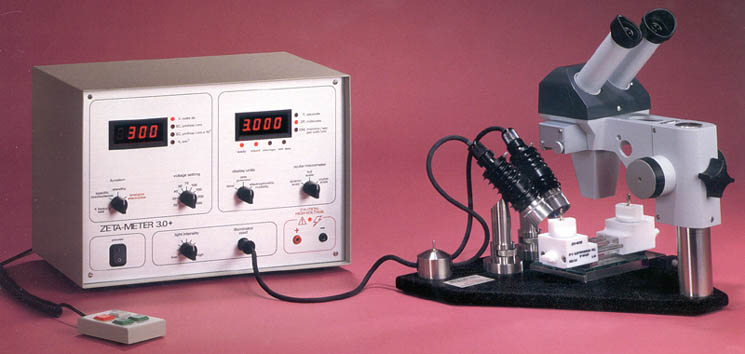
|
|
Model : Zeta-Meter System 3.0+ |
기본개념 |
Zeta Meter는 정전기적
전하의 영향을 측정하는 기계이다. 입자들은 서로 인접한
것끼리 척력을 작용한다. 한편 Van der waals force와 같은
인력도 작용한다.
콜로이드 용액에 기계적인 교반을 가했을때 충돌한
두 임자가 서로 인력을 작용한다면 둘은 뭉치게 되고 점점
더 자라나게 한다. 그러나 만약 서로 척력을 일으킨다면
그 정전기적 힘은 둘 사이의 거리가 짧아질수록 증가하므로
콜로이드 그 상태를 유지하게 된다.
미립자 표면의 전하는 그 콜로이드와 부유용액 간에
전위차(millivolt 단위의 크기로)를 일으키게 되는데 이것이
zeta potential이다. zeta potential은 두 전극 사이에
전압을 걸어주었을 때에 전극 사이에 존재하는 대전된 콜로이드가
움직이는 것을 이용하여 쉽게 측정할 수 있다. 그리고
그 이동속도는 zeta potential에 비례하게 된다. 이러한
현상을 electrophoresis(전기영동)라 한다. |
|
|
Zeta Potential |
-125 to +125
millivolts |
Electrophoretic
Mobility |
+20 to -20
microns/sec per volt/cm |
Specific
Conductance |
0 to 60,000
micromhos/cm, autoranging |
Temperature |
5 to 75℃ |
Concentration |
10 to 800,000
mg/l (0 to 80% solids by weight) |
Particle
Diameter |
1.5 to 100
microns (with standard 15x eyepieces)
0.4 to 10 microns (with optional 25x eyepieces) |
Sample Size |
20 ml minimum
(standard cell)
5 ml minimum (low volume cell) |
Suspending
Medium |
water or
otrganic liquids |
|
Applications |
Adhesives, Agricultural Chemical,
Asbestos, Atomic Energy
Beverages, biochemistry, Biomedicine
Coal, Dairy Product, Detergents, Dry Power Technology
Drystuffs, Emulsions, Fibers
Foods, Latex Production, Petrochemicals
Petroleum, Photographic Emulsions, Pigment |
Zeta-Potential 응용분야
1. Minerals &Ores (광물, 광석) - Coper, Lead, Zinc and Tungsten
2. Clays & Drillng Fluid - Paper, Adhesives
Ointments,
Rubber
and Synthetics
3. Ceramics : Slip Casting Control
4. Pharmaceuticals
5. Paints
6. Water and Wasterwater Coagulation
7. Paper Making
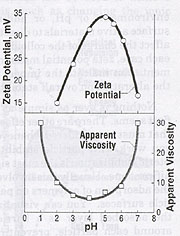
|
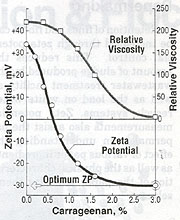
|
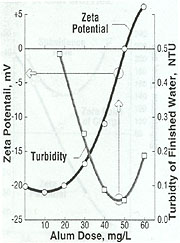
|
Control
of Slip Casting
Clay suspensions for slip casting must have their viscosity
minimized so that they pour readily and release trapped
air bubbles easily. The above figure shows the effect
of pH on the apparent viscosity and zeta potential of
thoria(ThO3). Note that a maximum zeta potential corresponds
to a low apparent viscosity. |
Fluidization
of an Antacid
Suspension
Fluidization is an alternative to flocculation. A negatively
charged colloidal polyelectrolyte is used as a
"fluidizing" agent. The polyelectrolyte adsorbs
onto the surfaces of insoluble particles and deflocculates
them once the zeta potential exceeds the critical value.This
graph illustrates the fluidization of an aluminum hydroxide
suspension using carrageenan sodium as the "fluidizing"
agent. The drops in zeta potential and viscosity of
the suspension correlate quite well with each other
and |
Zeta
Potential Control of Alum Dose
There is no single zeta potential that will guarantee
good coagulation for every treatment plant. It will
usually be between 0 and - 10 mV but the target value
is best set by test, using pilot plant or actual operating
experience.
Once the target ZP is established, then these correlations
are no longer necessary, except for infrequent checks.
Just take a sample from the rapid mix basin and measure
the zeta potential. If the measured value is more negative
than the target ZP, then increase the coagulant dose
(andvice versa). |
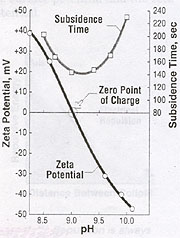
|
are
produced by an increase in the concentration of carrageenan. |
In this example a zeta potential of
-3 mV corresponds to the lowest filtered water turbidity
and would be used as the target ZP. |
Determining Point of Zero Charge
These experiments with alpha-alumina show good correlation
between the point of zero charge as determined by zeta
potential and the point of maximum subsidence rate.
Subsidence rate is measure of the degree of coagulation. |
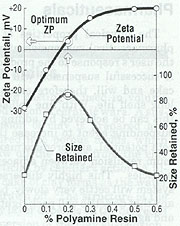 |
Synthetic Size Retention in Papermaking
The point of maximum size retention corresponds to a zeta potential of =4, which can be considered the optimum ZP. More positive or more negative values of the zeta potential cause a drop in the percent of size retained. Operating at the optimum value resultsin titanium oxide savings, improved sheet formation, increased wire life, improved sizing, pitch control, and biocide reduction. |
|
|
|
